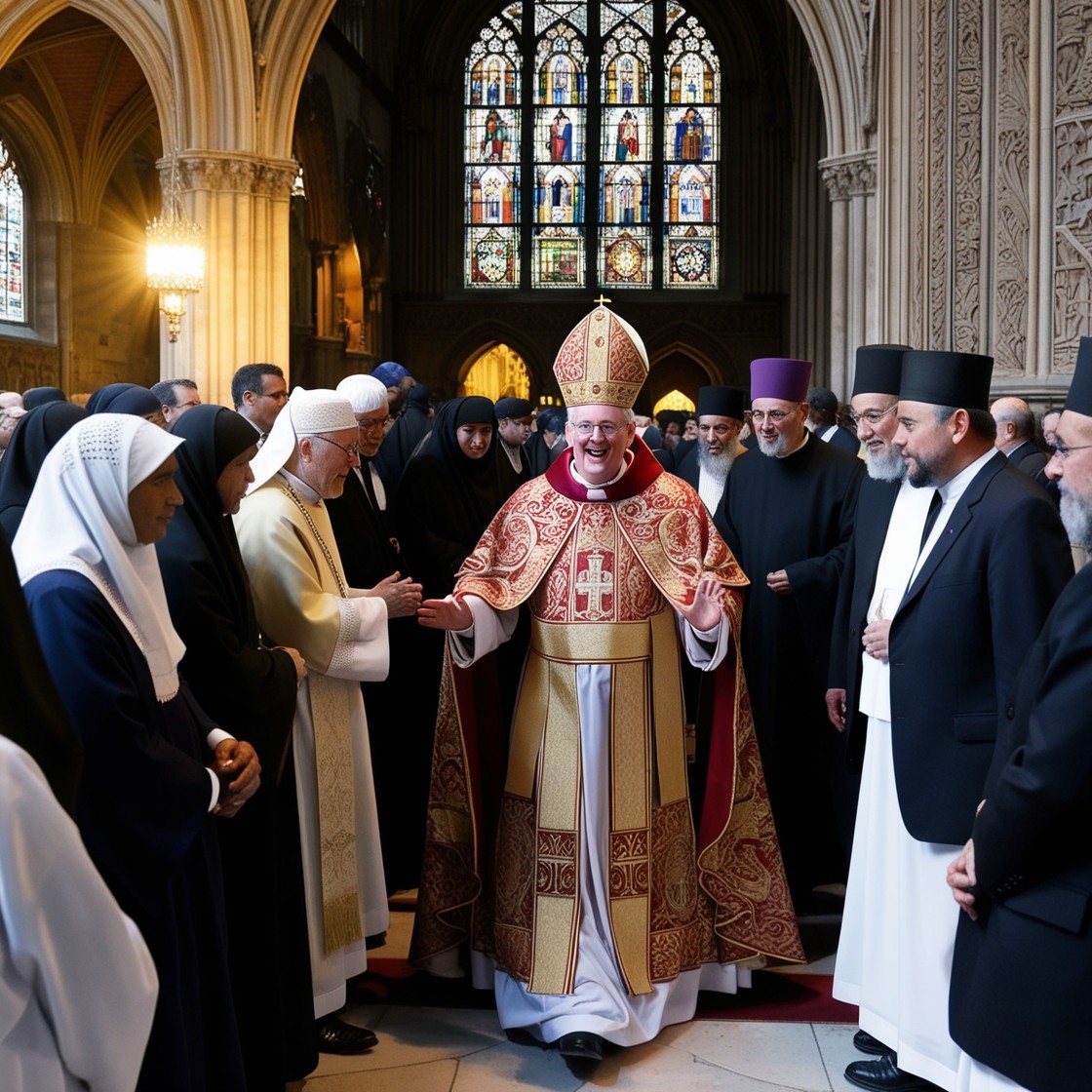
‘When people see a strong horse and a weak horse, by nature they will like the strong horse.’ Osama bin Laden
The demographic data we are permitted to see of those who are entering England today, legally and illegally, is sparse; though it’s certainly plausible that the government just dare not collect any more. Broad brushes we may have, but even these are enough to paint a crystal-clear picture of the only things that truly matter. Among which includes the fact the vast, vast majority are non-Christian.
One would expect in any normal, healthy state, that the leader of its official religion would be at least mildly concerned about the appearance in one’s flock, of vast multitudes who worship rival gods and revere heathen prophets above Jesus of Nazareth.
But apparently not. The Archbishop of Canterbury previously described the Rwanda plan as 'opposite of the nature of God'. One wonders which God Rev. Welby is referring to, for many of these newcomers reject his own outright. Indeed, see belief in Jesus’ divinity as a one-way ticket to eternal hellfire.
Not everyone’s as relaxed about the situation as Welby is however, and recent civil unrest in resistance to it has apparently upset him deeply. Writing in notorious sanctuary of Judeo-Christian values, The Guardian Newspaper, Welby labelled the protestors, whom he called ‘far-right’ as unchristian, condemning their promotion of Christian imagery as 'an offence to our faith' and ‘exploitative’. Just in case you didn’t quite get the jist, Welby went on to slander the English protestors as ’racist,’ 'anti-Muslim’ and ‘anti-refugee'. Even the idea of prioritising Christian refugees, arguably the most persecuted religious minority on Earth, over those of other faiths, is beyond the pale for a supposed world-leader of Christianity, having pompously rejected such calls in the past.
One wonders how Welby would respond if Starmer insisted that all new settlers must renounce their previous religions and accept baptism in Christ to live among us. It would hardly be without precedent. In in the year of our Lord, 878, Alfred the Great won a crushing victory over Guthrum, mighty warlord of the invading Viking horde known to historians and contemporaries alike as, ‘The Great Heathen Army.’ Alfred’s anglophone kingdom was the last still standing before the relentless heathen tide. One by one, the Anglo-Saxon kingdoms fell, isolated by bitter rivalries and old blood feuds. Men could flee from Northumbria to Mercia, from Mercia to East Anglia, and so on. But when Wessex stood alone, funnelled into their fertile peninsula, there was nowhere else to seek refuge.
So the English found a hill to die on, quite literally, and took a stand - rallying under King Alfred’s golden wyvern on a red banner, and meeting the merciless marauders in the borderlands of Wiltshire. After their defeat in pitched battle, the Danes took refuge nearby in the fortress of Chippenham, where the West Saxons besieged them, removing all food that might be captured in a sortie, and waited.

In two weeks, the starving Vikings sued for peace. They offered the usual hostages and solemn oaths as after previous reversals; but at Edington, Alfred had decisively defeated the Great Heathen Army, rather than merely checking its advance, so felt emboldened to further demand that Guthrum be baptised to seal the treaty, or the siege would continue. Guthrum agreed.
‘Fighting ferociously, forming a dense shield-wall against the whole army of the Pagans, and striving long and bravely... at last he [Alfred] gained the victory. He overthrew the Pagans with great slaughter, and smiting the fugitives, he pursued them as far as the fortress.’ Bishop Asser of Sherborne Describing the Battle of Edington in Life of King Alfred, c. 893
Somewhat surprisingly, this conversion appears to have been sincere. At the very least, Gurthum lived outwardly as a Christian for the remainder of his life as King of East Anglia. Whether this was due to genuine spiritual transformation or political expediency, on becoming ruler of thousands of Christian subjects, we shall never know. Nor does it matter, as I’m sure Alfred knew well. What mattered was that, as king, Gurthrum set the standard for his pagan settler-soldiers to follow. Certainly, within a generation or two, the vast majority of Danish residents in England had stopped sacrificing in Wotan’s name, or praying to Thor, and instead worshiped one God alone, that of Christ.
Of course, this phenomenon occurred to the Anglo-Saxons themselves just a few centuries prior, when priests dispatched by Pope Gregory I to convert the heathens now residing in the former imperial province, set out on their mission. The story goes that Gregory was walking through a slave market in Rome when he saw some children for sale with striking blue eyes and bright blonde hair.
‘What people’ he asked, ‘did they come from?’
‘They are Angles’ he was told, to which the pontiff replied, ‘They are not Angles, but angels (Non Angli sed angeli) and like angels, they should sing praises to God.’

It was a process replicated throughout the ruins of the Roman Empire - Germanic kings in the West were converted by Latin missionaries, whilst Slavic chiefs were converted by Greek ones in the East, sowing the seeds of the ultimate schism between Catholic and Orthodox Christianity half a century later. But at the time, it must have felt as though all the disparate peoples of the world had become one. This is the whole point - once incorporated into Christendom, these ‘barbarians’ were no longer considered either prey or predator, but rather brother and sister. One of the great benefits of monotheistic religions, whether you accept their supernatural claims or not, is that they incorporate all respective followers into a single unified tribe, extending a sphere of moral empathy that usually encompasses only one’s immediate kinship group. Indeed, etymologically the very word ‘kind’ comes from the Old English cynn (kin), which itself derives from the proto-Germanic noun kunją (family). We know that Christians referred to each other as ‘Brother’ and ‘Sister’ far more routinely in earlier days, much as Muslims do in the present one.
Though an Atheist, yet can I acknowledge the fact Christianity is a core foundation stone of Western Civilisation; and it doesn’t take a genius to figure out it is far easier assimilating peoples from similar cultures than very different ones. In Northern Ireland, the distinction between Protestants and Catholics is minuscule in the grand scheme of things, but that small disparity in creeds has resulted in untold misery and destruction over the centuries, and up to the present day. For whenever there is an in-group, there is an out-group.
But Justin Welby appears to believe that despite all that, importing legions of fighting-age men from a totally alien, and often openly antagonistic, culture will lead to nothing but harmony and peace. Should any conflict arise from this unprecedented demographic transformation, Welby reasons, the fault lies solely with us, and not at all with the new arrivals.
Bear in mind that in all the Viking invasions of the Early Middle Ages, no more than around 30,000 additional people settled in England as a result. This represents about a week’s worth of immigration today, but this time, alas, they’re mostly not coming from Denmark, Sweden or Norway.
Perhaps Welby genuinely is worried about mob violence. After all, his predecessor as Archbishop of Canterbury was lynched to death during the last English Peasants Revolt in 1381. And you know what they say about history…
Though we mustn’t be too harsh on poor, confused Rev. Welby. For belying his name, he is not well at all. The mind-virus consuming him is the true pathology, his attitude but its symptom. The liberal delusion accepted by all ‘polite society’ that enlightenment ideals are shared equally by mankind, that all religions espouse more or less the same message, and that Christian values are universal ones, shared by all men, even as they pray to foreign gods or none at all.
As an atheist with a sincere interest in religion, I’m often taken aback at how often I know more about a theist’s prescribed doctrine than they do themselves. Self-identifying Christians in particular, barely know anything about their own faith, let alone anyone else’s. The exception to this rule is Muslims. In general, I find they have a deep understanding of Islam, and even other religions, and tend to have little compunction in asserting the superiority of their own. Note that ‘Allahu Ackbar’ does not mean ‘God is great’ as is often mis-translated, but ‘Allah is greatest’ i.e. greater than all other gods.
I recall seeing one of these insipid ‘interfaith dialogue’ meet-ups a few years ago, after whichever latest Islamic atrocity was making headlines that week. A Priest, a Rabbi and an Imam sat together on stage, unusually unwilling to engage in any actual dialogue, and seeming far more interested in posing for press photos. Prompted by one reporter however, they were asked what they knew of each other’s scripture.
‘I have sadly not read the Quran,’ said the Priest. ‘I regret to admit the same,’ intoned the Rabbi. ‘Oh yes,’ the Imam said with a smile, eyes sparkling, ‘I know them well, the Hebrew and Christian bible both, and can even quote you verses if you’d like.’
Welby may see humanity as one big, happy, interchangeable family, but the feeling is far from mutual. As with all extant great apes, Homo sapiens are tribal animals, thinking of themselves as part of an identity group, to whom they owe their allegiance above anyone outside it. And there are few things closer to the core to one’s identity than Faith. Religions, especially monotheistic ones, may expand the boundaries of one’s tribe, but they also define its demarcation. A fact that, until recently, Christians understood all too well.
Some may think that, as an atheist, I don’t have a dog in this fight. But you’d be wrong. What we once called Christendom is among the few places on Earth where atheists are allowed to flourish and thrive. In Bangladesh, as in other parts of the Islamic world, we are routinely run down and hacked to pieces for our religious beliefs (or lack thereof).
No, atheists very much do have a dog in this fight. Indeed, it is the fight of our lives. As such, I for one will continue struggling in defence of Christian Civilisation, even if the Archbishop of Canterbury refuses to.
Demosthenes of Hertfordshire has a substack here